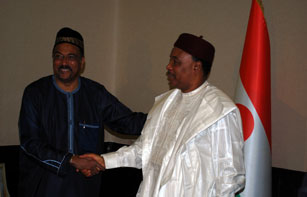
Feature Story
Niger’s First Lady commits to stopping new HIV infections in children
28 March 2013
28 March 2013 28 March 2013
First Lady of Niger Aïssata Issoufou Mahamadou (next to UNAIDS Executive Director Michel Sidibé) launching her foundation to promote development through health, education and poverty reduction. Niamey, Niger, 28 March 2013.
Credit: UNAIDS/D.D.Abdoulaye
The First Lady of Niger, Aïssata Issoufou Mahamadou, promised to use her influence to greatly expand prevention of mother to child transmission (PMTCT) services in her country. She made her commitment during the official launch of her foundation, “Guri, for a better life,” on 28 March in Niamey, Niger. UNAIDS Executive Director Michel Sidibé was among the leaders and eminent personalities who participated in the inauguration.
Niger has made progress in its HIV response. Between 2001 and 2011, the rate of new HIV infections was reduced by almost 30%. Niger estimates that there were a little over 6000 new HIV infections in 2011. However, the country is struggling to improve its HIV services. In 2011 less than 40% of people living with HIV in need of antiretroviral drugs had access. Only 30% of pregnant women living with HIV had access to treatment to prevent transmission of HIV to their children.
In her speech during the inauguration, the First Lady said, “Guri, for a better life is the fruit of a big dream to see Niger become a haven of peace and joy for women and children.”
The First Lady’s foundation is dedicated to promoting development in Niger through health, education and poverty reduction. The country is struggling with the world’s highest fertility rate with 7.6 children born per woman in 2012. Malnutrition contributes to more than half of all deaths of children under five.
Currently in Niger, 99% of funding for HIV programming is dependent on foreign sources. Mr Sidibé urged the government to increase the share of domestic funding on the AIDS response and applauded efforts that had already been made. In Niger in 2011, the budget for HIV programming was US$ 14 million in 2010, an increase of 7.4% compared to the previous year. PMTCT represented only 2.6% of the total government budget, but rose to 16.9% in 2011.
Mr Sidibé said, “Niger has made incredible progress in reversing the AIDS epidemic and expanding coverage of HIV services for pregnant women living with HIV.”

UNAIDS Executive Director met with President of Niger, Mahamadou Issoufou and urged him to support the production of ARVs in Africa.
Credit: UNAIDS/D.D.Abdoulaye
The UNAIDS Executive Director met with President of Niger, Mahamadou Issoufou and urged him to support the production of ARVs in Africa. Like most other countries in Africa, Niger relies on imports for its ARVs. Currently African countries import 80% of ARVs, primarily from India.
Mr Sidibé said, “I am counting on your leadership to position Africa in the post 2015 agenda with a strategic vision and to promote the local production of ARVs in Africa.”
The President said, “I am convinced like you that the production of medicine locally is essential.”
The inauguration took place with the First Ladies of Swaziland, Nigeria and Chad who are all members of the Organization of African First Ladies against HIV/AIDS (OAFLA). The First Ladies are committed to using their influence to improve the lives of vulnerable families through advocacy, and mobilization of resources.


